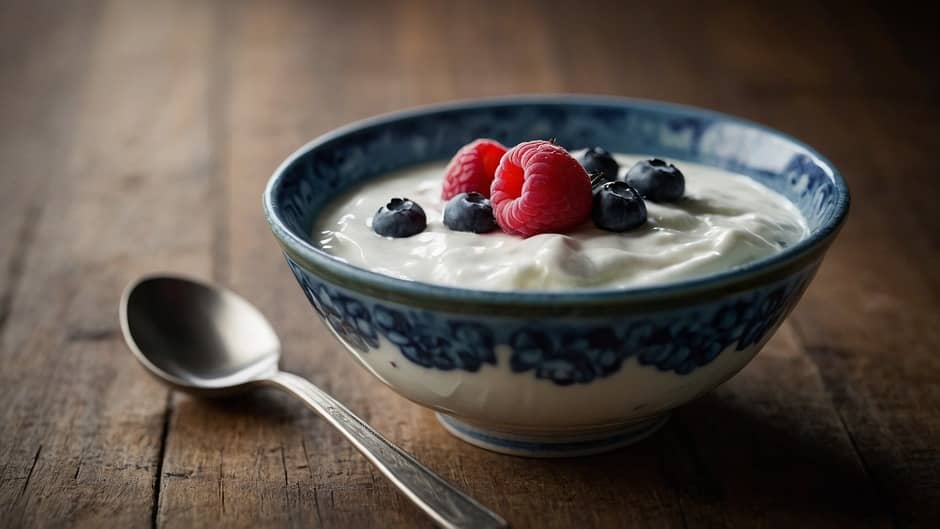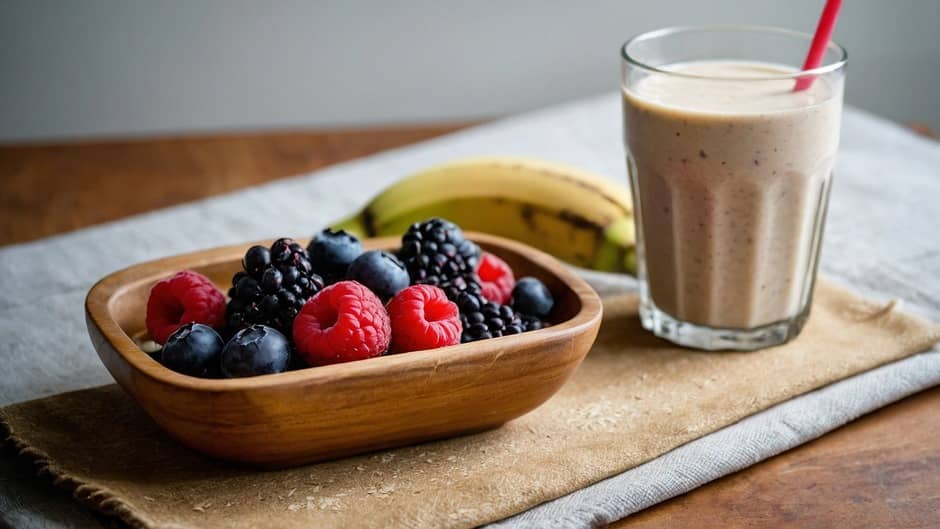Table of Contents
- What Happens If You Ignore Lactose Intolerance?
- How Can You Tell If You Are Lactose Intolerant?
- Is Yogurt Bad For Lactose Intolerance?
- Is Greek Yogurt Bad For Lactose Intolerance?
- Some Lactose Free Foods To Eat
What precisely is lactose intolerance?
In short, it happens when your body struggles to process lactose, which is the sugar found in milk and other dairy products.
Lactase is an enzyme that is routinely produced in the small intestine. But, is lactose free yogurt better for you? It breaks down lactose into simpler sugars that are easier to absorb.
The formation of lactase, however, is either extremely poor or nonexistent in those who are lactose intolerant.
When undigested lactose stays in the digestive tract, a variety of uncomfortable symptoms might occur.
Many people think that eating lactose will make them narrow-minded and immediately imagine loose stools, which are caused by the water that enters the digestive tracts.
But sometimes, especially when the digestive system is straining to break down the undigested lactose, things can slow down a lot.
The steps involved are as follows: If you do not get enough digestion of lactose, your intestines can become a little slow. Unabsorbed lactose can lead to loose stools by attracting water into the colon.
There’s a catch, though: if your body takes in too much water from your stool, it could make passing stool difficult.
This is referred to as constipation.
Moreover, lactose intolerance strains your digestive tract, making water absorption even more difficult.
This stress may throw off the regular rhythm of your intestines, leading to irregular bowel motions.
It happens like this: your stomach gets a little confused and doesn’t know exactly how to keep things going smoothly. Research backs up this. Studies show that people with lactose intolerance experience constipation more frequently than people without it.
Although they aren’t usually seen as distinct side effects, something can happen.
Dairy may be something to think about if you’ve been feeling lethargic and don’t know why.
What Happens If You Ignore Lactose Intolerance?
After enjoying a satisfying bowl of ice cream or cheesy pizza, you experience bloating, discomfort, and gas shortly afterward.
You may get more than just a mild upset stomach if you don’t take care of your lactose sensitivity and keep eating dairy products. Ignoring lactose intolerance can lead to discomfort and ongoing digestive problems.
Lactose intolerance is caused by a deficiency of the enzyme lactase, which breaks down lactose, the sugar found in milk and dairy products. After consuming dairy products, lactose ferments in the digestive tract, causing diarrhea, bloating, and gas.
If you keep eating dairy in spite of these negative consequences, it might exacerbate these problems and further weaken the structure of your stomach.
This could eventually lead to ongoing stomach problems.
How Can You Tell If You Are Lactose Intolerant?
Thus, how can you determine if lactose intolerance?
Often, the first thing to do is observe how dairy affects your body.
If you get symptoms such as bloating, gas, loose stools, or cramping in your stomach shortly after consuming dairy products, lactose intolerance could be the cause.
One popular technique for identifying lactose intolerance is the lactose tolerance test.
To do this, you consume a high-lactose beverage, and your blood is continuously checked to determine how well your body metabolizes the lactose.
The hydrogen breath test is an additional examination that quantifies the amount of hydrogen exhaled after consuming a lactose-rich beverage.
High hydrogen levels can indicate an overall inadequate processing of lactose. It is advisable to consult a physician if you suspect you may have lactose intolerance, as the two disorders can occasionally be misdiagnosed.
They can help you get a proper diagnosis and recommend the best course of action for your symptoms.
Also Read – Can Lung Function Improve After Quitting Smoking? – How To Detox Lungs After Quitting Smoking? (2024)
Is Yogurt Bad For Lactose Intolerance?
Now let’s talk about yogurt. For many people who are lactose intolerant, yogurt can be a bit of a murky area.
Unlike milk, yogurt has living bacteria in it that help break down lactose. These probiotic bacteria may make yogurt simpler to digest for some people who are lactose intolerant.
If you are lactose intolerant, yogurt might be simpler for you to handle than other dairy products.
This isn’t always the case, though.
There are some people who genuinely feel uncomfortable after consuming yogurt, especially if it isn’t specifically labeled as low- or non-lactose. It all comes down to how much lactose your body can tolerate and if yogurt’s probiotic microbes are good enough to break it down for you.
Selecting yogurt with living and active cultures is a smart move, as these cultures help with digestion.
Greek yogurt, which often has a lower lactose level due to the stressing procedure it goes through, may also be the best option for you.
Is Greek Yogurt Bad For Lactose Intolerance?
It’s common advice for people with lactose intolerance to use Greek yogurt.
This is because straining removes the majority of the lactose-rich whey found in Greek yogurt. Straw yogurt is less lactose and has a thicker consistency.
For some people, this makes making Greek yogurt easier than with regular yogurt.
Still, it’s critical to be aware of how your body responds.
Greek yogurt is not lactose-free, even though its lactose content is usually lower. If you are extremely sensitive to lactose, you can still experience some discomfort.
To see how it affects you, start with a modest amount.

Some Lactose Free Foods To Eat
1. Fruits and Vegetables
First of all, lactose is not naturally present in fruits or vegetables.
They are full of vitamins, minerals, and fiber and make a great addition to any meal.
Superb choices include carrots, apples, oranges, bananas, berries, and salad greens like kale and spinach.
They taste well raw, blended into smoothies, or combined with a big salad.
2. Grains and Legumes
Oats, quinoa, and rice are examples of grains that are devoid of lactose.
They can be the basis for a variety of meals, whether it’s a satisfying bowl of oatmeal in the morning or a flavorful quinoa salad. Additionally lactose-free, beans, lentils, and chickpeas are excellent sources of fiber and protein.
They work well in stews, soups, and even a delicious bean plunge.
3. Nuts and Seeds
Nuts and seeds are another type of food that does not contain lactose.
Walnuts, chia seeds, flaxseeds, and almonds are not just low in lactose but high in protein, good fats, and other nutrients.
You can eat them as a snack on their own or sprinkle them over salads, yogurt, and cereal.
4. Lactose-Free Dairy Alternatives
There are many of lactose-free substitutes available for people who prefer the taste and texture of dairy.
Almond milk, soy milk, oat milk, and coconut milk are excellent dairy alternatives.
They make great drinks on their own and are great for baking and cooking. Lactose-free yogurt and cheese are also made from these plant-based milks.
5. Lean Meats and Fish
Fish and meats are typically lactose-free. Pork, beef, poultry, and fish like salmon and tuna are among the options. They are a great source of necessary proteins and may be cooked in a multitude of delectable ways.
Just pay attention to how they’re cooked and seasoned to keep them lactose-free and nutritious.
Also Read – Relationship Between Carbohydrates And Sugar – High Sugar Content Foods To Avoid (2024)
6. Eggs
Another meal that doesn’t contain lactose that might be a mainstay in your diet is eggs. They are versatile and work well in many different recipes, such as omelets, scrambled eggs, and baking.
They’re also a fantastic source of protein and other important vitamins.
7. Lactose-Free Products
Many grocery stores now carry lactose-free versions of traditional dairy products. Lactose-free milk, cheese, and yogurt are specifically designed for individuals who experience difficulties with lactose digestion.
They taste just like their conventional equivalents, even though they don’t contain lactose.
8. Herbs and Spices
Herbs and spices are always important to remember!
They are naturally lactose-free and can improve the flavor of your food.
A dish can taste fantastic when it incorporates fresh herbs like cilantro, parsley, and basil along with spices like cinnamon, turmeric, and garlic.
Read us on Medium.




